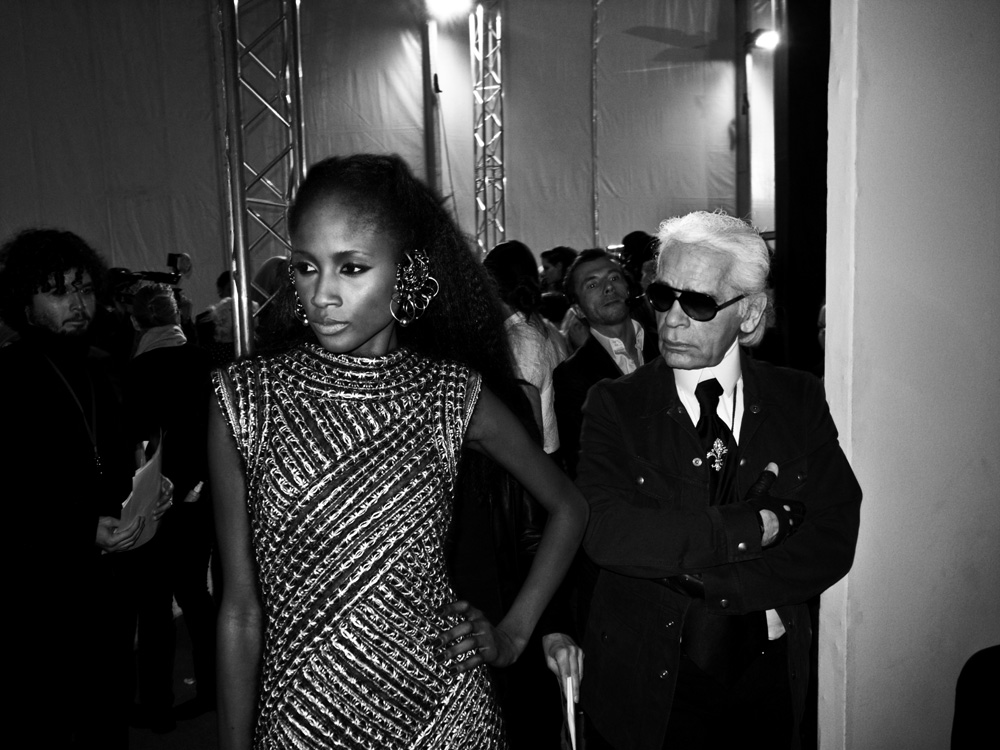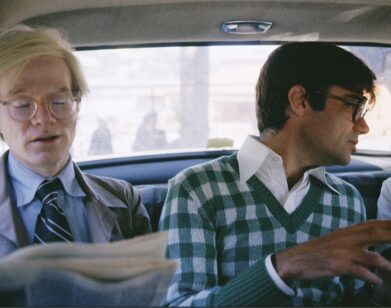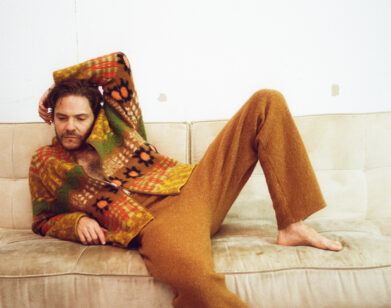Karl Lagerfeld: ‘I bring myself with me wherever I go’
This spring, during Paris Fashion Week, Karl Lagerfeld unleashed another youthquake on the runway — tight, militant, and black, with exaggerated shoulders reminiscent of the designer’s ’80s signature indulgences. No, it wasn’t for Chanel, but for his eponymous label, Karl Lagerfeld. Originally founded in 1998 as Lagerfeld Gallery, the brand has served as a playground for Lagerfeld’s wilder fashion instincts. The latest collection was a rock-minimalist take on the not-so-near future, with mod motorcycle helmets — done in conjunction with the upscale French helmet company Les Ateliers Ruby — which came equipped with compartments for iPods. Budding supermodel Sigrid Agren opened the show wearing one such helmet. Earlier in the week, the 18-year-old Martinique native took a few minutes out of her fitting for the show to ask the world’s most famous designer a few questions about life and work. We followed Lagerfeld through his fitting as well as backstage on show day to get a glimpse of how Karl Lagerfeld does Karl Lagerfeld.
———
KARL LAGERFELD: Who had the idea to name you Sigrid?
SIGRID AGREN: Actually, my father is Swedish . . .
LAGERFELD: Do you know that your name comes from a half-goddess in Northern mythology?
AGREN: No, I didn’t know that. Okay, my turn to ask you a question: Do you have a favorite piece in the Fall 2009 Lagerfeld collection?
LAGERFELD: This I can only tell you when our show is over, because as long as the show isn’t over, you can never get an impression. But I love the details of the motorbike helmets. It is so difficult for me to say. My opinion can be completely different after a show.
AGREN: I love the helmet. How did you get the idea to make that?
LAGERFELD: It looks like the huge hairdos from the 1960s, which everyone thinks are pretty ugly. So the helmet is like a huge amount of hair, made of fur. And it’s for your music, because there’s a holder inset for your iPod and room for earphones, too. The helmet works with the technology that is useful in daily life.
AGREN: Very nice. Where does your inspiration come from when you’re working on a collection?
LAGERFELD: A collection is not just one basic idea. It comes from something that is in the air, something you suddenly like and put down on paper and then work out. People today are so used to taking one theme and staying with it all the way. I don’t do that. It’s about cut, about construction. I wanted shoulder, but a new volume, so I made what I call the Big Shoulder. I’m more interested in working out technical ideas than I am in themes or illustrating a scene or a country or whatever.
AGREN: If you could do anything in your life over again, what would it be?
LAGERFELD: I don’t want to do anything over again, ever again. I want only to do what I haven’t done. There’s no “again.” There’s only the future. I hate the past—especially my own past.
AGREN: Is there anything you haven’t done that you’d like to?
LAGERFELD: Hmm . . . yes. I have got to stay with what I’m doing now . . . [hits hand on table] this collection . . . [hits hand on table] photography . . . [hits hand on table] books. There are three jobs for one person and that is okay for me.
AGREN: What’s your favorite music right now?
LAGERFELD: It depends on the genre, but, for the moment, I like the latest Scissor Sisters CD. I also just got this CD of Yoko Ono and her son, who make very interesting music together.
AGREN: Do you have an all-time favorite musician who you’ve loved forever?
LAGERFELD: Yes. Some of the musicians from the ’60s, because there has been nothing better than them since, you know? What I like about music is the songs you can remember the lines of in a single second. The Beatles, The Rolling Stones . . . You can remember every line to their songs. But today, how often do you remember any of the lines to songs? I mean, I know Lily Allen’s last album is called It’s Not Me, It’s You. [both laugh] But I don’t know how the songs go.
AGREN: Where do you feel most at home?
LAGERFELD: Wherever I am now. Here.
AGREN: Here? At the fittings?
LAGERFELD: Yes, I don’t have the notion of the feeling of “home,” or “Heimat,” as the Germans say. That doesn’t exist for me. I bring myself with me wherever I go, so it’s okay.
AGREN: Okay. How do you look when you wake up?
LAGERFELD: That’s why I sleep alone. My hair is curly, and that’s why I have my ponytail. I look like a madman, like something out of a horror movie! But I’m very impeccable and clean before I go to bed. It’s just like right before I’m going out. When I was a child, my mother always told me that you could wake up in the middle of the night and be deathly sick, so you always have to be impeccable. I laugh about it now, but I think everyone should go to bed like they have a date at the door.
AGREN: What advice would you give me on becoming a supermodel?
LAGERFELD: That’s very difficult. I’m not a girl, but for a supermodel, my advice is that it’s based on . . . [hits hand on table] no justice. It’s not because you want to be a supermodel, or because your mother thinks you’re a hundred times better than Claudia Schiffer. You can be a model like yourself, very elegant and chic, or you can become a kind of advertising PR person, like Heidi Klum. You can do whatever you want, but it isn’t really your choice. You want to know what the real secret is?
AGREN: Tell me.
LAGERFELD: It’s not being perfect. What one needs is a face that people can identify in a second. That’s why the girls who were famous in the ’90s can still work for advertising. People know their faces. The little blonde Russian, Sasha [Pivovarova], has a face people can remember instantly, but for other models today, people think, Is she this one or that one? It’s very difficult, but, you see, in fact there is no advice, because all circumstances are very different. It depends on what you are ready to give, the kind of life you bring, what may be exciting or disappointing . . . You can’t accuse anyone of not doing enough to help you, because, besides yourself, there’s nothing anyone can do. You have to be given what’s needed by nature, and what’s needed is to bring something new. But it’s the most . . . [hits hand on table] unjust . . . [hits hand on table] thing in the world.
AGREN: Thank you so much, Karl.
LAGERFELD: Well, it’s true, isn’t it?




